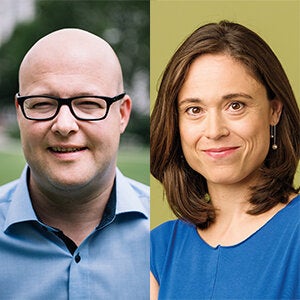For many educators, responding to the arrival of COVID-19 last year meant shifting to entirely online instruction with little notice, often a staggering endeavor. Yet Johannes Kepler University Linz’s Elke Schüßler and University of Innsbruck’s Leonhard Dobusch went a step further.

Not only did the two professors shift to all-online instruction—they created an entire course that responded to the moment in both form and content. First offered in the spring of 2020, Organizing in Times of Crisis: The Case of Covid19, not only made use of a full suite of digital tools, it pulled together a thorough array of readings on the implications of a crisis in the process of unfolding. Now recognized with an Ideas Worth Teaching Award for their course, we spoke with Elke and Leonhard about what it takes to pull together rigorous teaching in response to headline-making news.
It’s impressive that you organized both a detailed syllabus and co-teaching structure with professors across Germany and Austria, seemingly as the virus broke out! How did you do it, and what advice would you have for professors who are looking to develop a course in response to sudden societal change?
Leonhard: The topic of the Covid pandemic was new and there was a widespread momentum to do something and experiment. The rest was a recombination of extant resources such as our academic network and experience with research blogging and open content licensing. Also, division of labor was key. Since we asked all contributors to focus on core areas of their expertise, they could leverage experience and focus just on their own parts.
Elke: We provided a clear structure for the collaborators to work into and defined expectations, so everyone knew what to do and by when. It surely also helped that we knew each other and could build on prior collaborative experience. This actually sums up our advice: use the momentum to do something new while building on prior ties and experience; clarify expectations and – especially if we are talking about rapid response – don’t aim for perfection, but for good content presented in practical and re-usable formats.
How does your focus on organization theory help students understand the roles of government and business in tackling the societal challenges of the pandemic? What does the added analysis of social media communications add to this perspective?
Elke: Organizations play a key role in the response to the pandemic. Organization theory looks at all kinds of organizations, not just businesses: public organizations, inter-organizational networks, transnational organizations like the WHO, hospitals, research organizations as well as local community organizations or social movements. An understanding of our social life paired with core organization-theoretical knowledge, such as the advantages and disadvantages of different mechanisms of coordination, helps students make sense of current developments. Communication is, of course, a core dimension of organizing and crisis communication is an important part of crisis management. Thus, we dedicate the whole class of #6 to this topic. We focus specifically on social media, because they play such an important part in how the crisis – and the response to it – is socially constructed, which has very material consequences: the construction of the crisis influences how people behave. And in a pandemic, this can quickly amount to a matter of life and death.
Leonhard: We offered various theoretical perspectives but left it to the students to apply this knowledge to the ongoing pandemic. We deliberately asked the students themselves to reflect on more or less promising practices in different circumstances concerning questions such as centralized versus decentralized responses or open versus closed science. To a certain degree, this is what we consider most important in management education: increasing the range of perspectives available when confronted with real-world problems, not creating the false illusion of ready-made solutions or one-best-ways. The issue of social media communication in times of crisis is actually a good example here, because it is marked by countervailing dynamics that need to be dealt with. On the one hand, social media allows for a polyphony of voices that brings a broader variety of potential solutions to the table. On the other hand, because of platform algorithms that optimize for attention, social media communication often fuels polarization, making it harder to agree on an option. Organization theory offers various approaches for addressing this issue such as different forms of crowdsourcing, inclusive organizing or new forms of organizing like the German #WirVsVirus hackathon, which are discussed in class #7 of our course.
Europe and the U.S. are now approaching the one-year anniversary of the initial Covid lockdowns. Based on your research, what do you predict for the months ahead, and in terms of lasting changes as business and society adapt to the pandemic?
Leonhard: Given that pandemics are comparably rare but world-shattering events, we will observe much more awareness and preparedness for the next couple of years ahead. We will probably even see much more appreciation of solidarity-based public institutions for health care, the unemployed and beyond. However, and this is a parallel to large-scale financial crises, as memories fade so will the willingness to invest in necessary precautions and public institutions well-equipped to fight such a threat.
Elke: Exactly. Covid-19 can be considered as a “focusing event” that brings many problems beyond the pandemic itself to the public attention and onto the political agenda. Whether it will result in policy action and change will depend on private or public actors – determined politicians, social movements or civil society organizations – and their efforts in maintaining attention to these problems once the acute crisis passes. My initial optimism that we will use this crisis to build a more just and sustainable economy and society, however, has been dampened a bit in recent months. The pandemic puts the limelight on immense inequalities, the poorest and hardest working are the least protected and valued, and many people seem to prioritize shopping and skiing over changing their behaviour for the public good. I also haven’t seen rescue plans for airlines or car companies being tied to obligations to restructure and develop new business models. So again, we see huge inequalities – artists and small entrepreneurs indeed have to be creative and transform themselves to survive, but those with structural power can simply stick to doing more of the same.
As alumni from your course go into leadership positions across industries and sectors, what is the one lesson that you hope will stick with them throughout their careers?
Elke: As an organization theorist, I hope that they will have understood that organizations – including their leaders and members – are a key part of our societies and that their role is not just to make profit, but to address social problems. I also hope that they will have learned the importance of persisting with creative ideas rather than being discouraged by resistance, which will inevitably come up. Here the knowledge that organizing and leading are social processes that entail communication, negotiation and collaboration will hopefully have provided the right basis.
Leonhard: We are in this together. Not only when fighting a pandemic but in modern societies that rely on an extensive division of labor more generally. This is also the reason why the last of the 12 classes of our course deals with the topic “How Grand Challenges Link Together”. None of the grand challenges ahead – from the climate crisis to increasing inequality – can be solved unilaterally. The necessary cooperation and coordination is an organizational challenge in its own right. Hopefully, alumni from our course are a little better equipped to play a part in tackling these challenges.
![]()
Interested in more innovative insights for business education? Browse our complete collection of interviews with outstanding educators, and subscribe to our weekly Ideas Worth Teaching digest!

